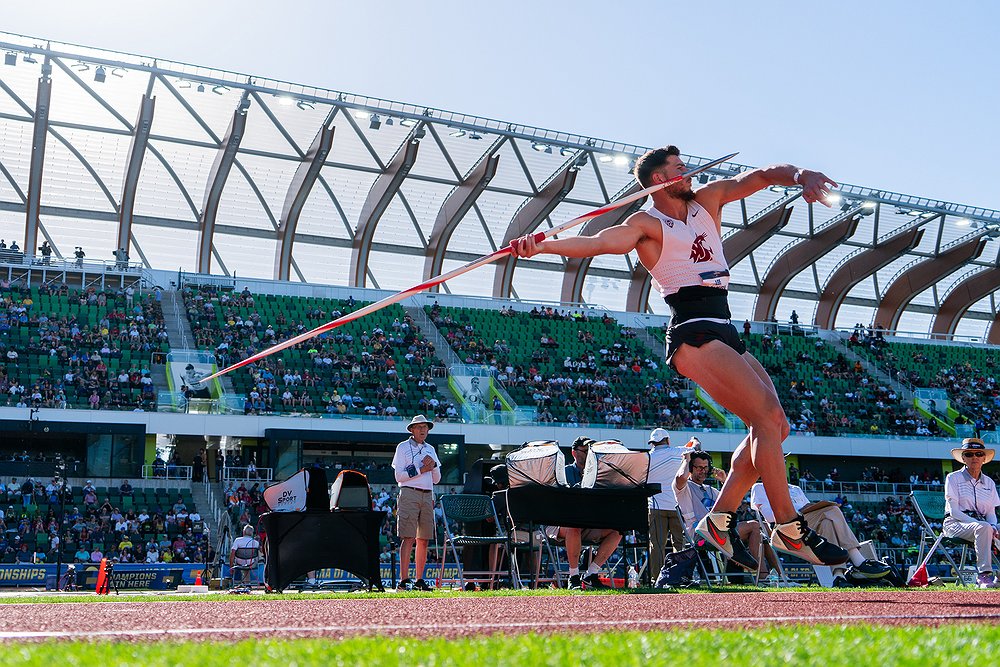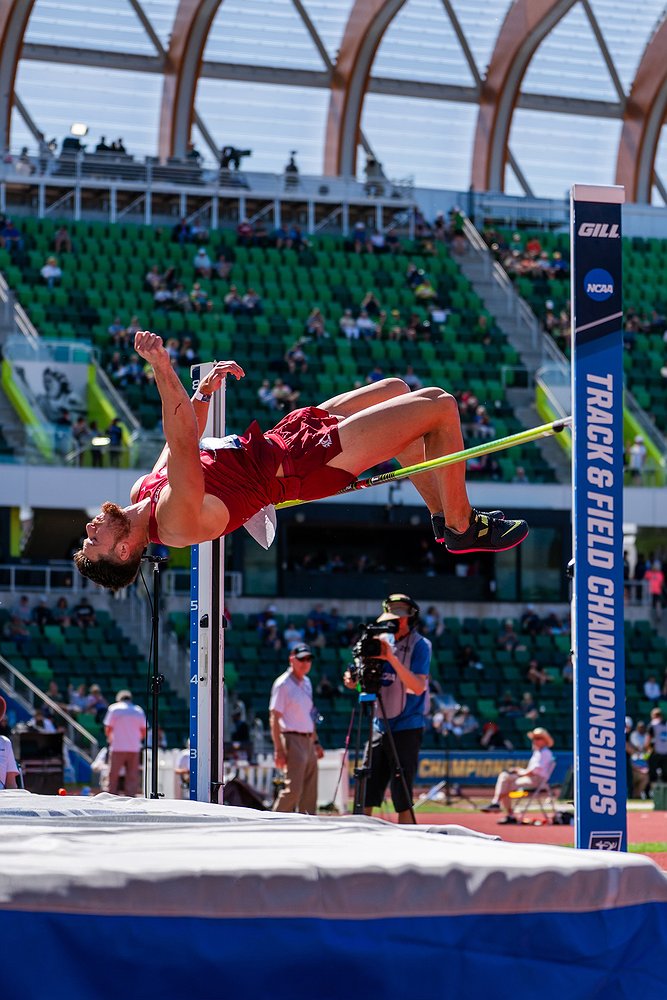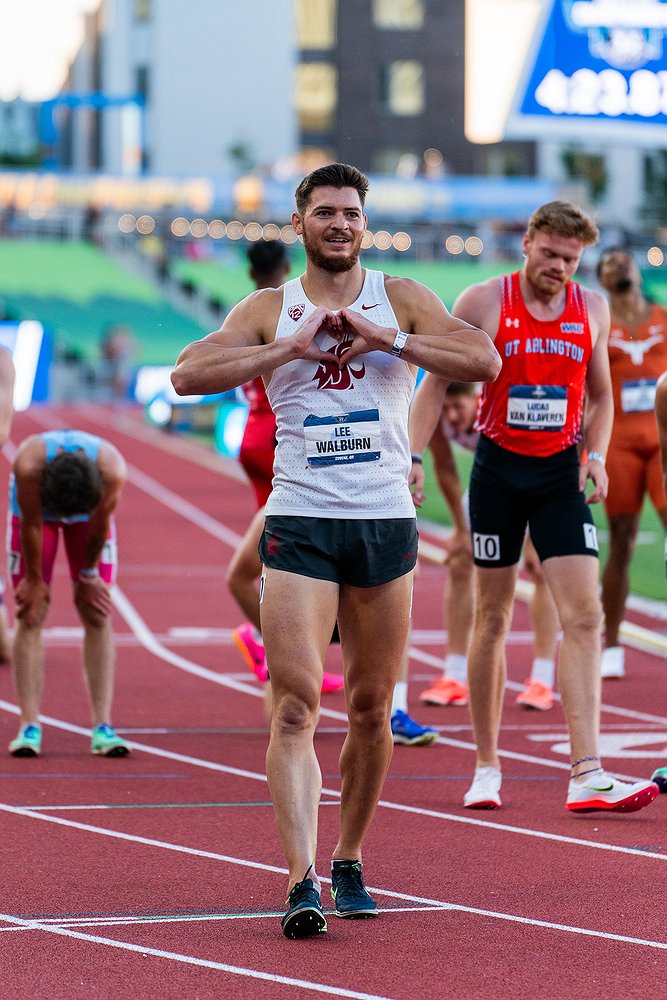Whitefish's Lee Walburn eyes comeback after ruptured Achilles ends his Olympics bid
Whitefish High School alum and decathlete Lee Warburn graduated from Washington State University in May with a degree in humanities – although if you ask his parents, Janis and David, they’ll say he earned his degree in track and field.
In early June, Walburn placed seventh in the NCAA Outdoor Track and Field Championships at Hayward Field in Eugene, Oregon, earned first team All-America honors and raised his rank to eighth in the nation.
Just two weeks later, he competed in the U.S. Olympic Track and Field Trials held in the same stadium.
“It was definitely … the most excited I've ever been for a competition,” Walburn said. “There’s something about the U.S. trials where it's one of the most competitive, most stressful meets.”
He said what makes the Olympic trials so unique is that some of the best track athletes in the world won’t make the U.S. team because of a trip or because it just wasn’t their day. He mentioned reigning Olympic 800-meter champion Athing Mu, who tripped in the trials and failed to make the team.
Unfortunately, Walburn’s trials ended after eight events when he suffered a ruptured Achilles. Still, he ended up in 15th place without the final two events.
Usually, decathletes take one or two weeks off between competitions. The winner of the decathlon at the U.S. Olympic trials had opted out of the NCAA championships so he could prepare.
Decathlons are two back-to-back days of competition, with five events each day. The first day consists of the 100-meter, long jump, shot put, high jump and 400-meter. The second day’s events are the 110-meter hurdles, discus, pole vault, javelin and 1500-meter.
“The first couple events went great,” Walburn said. “My whole goal was to do things better than I did in the NCAAs – do things technically better in some events and replicate other events to prove it wasn't a fluke.”
He started with a personal best time in the 100 and improved his long jump. He said the shot put was frustrating because he threw well in the warm ups but was trying too hard when it came time to compete.
“High jump was awesome because I got to calm down and jump 6-6 for the first time in my life,” he said. “That was an incredible feeling.”
His impressive 48 second 400 allowed him to finish out the first day on a high note. Walburn had never broken 4,000 points after the first five events and he had just scored 4,078.
“The second day, you definitely feel it in your body,” he said. “Oh goodness. You feel like you got hit by a truck when you wake up the next morning.”
Day two began with the hurdles.
“I started jumping up and down right before you get into the blocks and something kinda feels funny in my legs but, you know, didn’t think about it much and ran a pretty decent time,” he said. “Discus was great because … I was frustrated with how I threw in the NCAAs.”
After a fifth-place finish in the discus, Walburn moved on to pole vault.
“Pole vault was going fantastic. I kept having this kinda nagging kind of thing in my foot, but I'm so used to pushing through things or dealing with injuries,” Walbrun said, referring to groin and hamstring injuries that have troubled him this year. “Just keep pushing through it.
“We were vaulting super well and … I cleared my 15-5 or 6, by like a foot and man … we’re vaulting good and I see my name on the scoreboard and I'm in the ninth or eighth spot and I know my next events are [javelin] and the [1,500], and jav is one of my best events,” Walburn recalls. “And the 15, we’ve just been getting better and better.”
He said he began thinking of the plan that he and his coach, Derick Hinch, had. If Walburn could finish in the top seven or eight at the Olympic trials, they could go to the Thorpe Cup, an annual decathlon between the U.S. and Germany.
Then, he said he realized he had to let those thoughts go and focus on the task at hand. He took off down the runway for his pole vault and felt a pop and pain in his left leg.
“As soon as it happened, I knew what I'd done. Not the greatest feeling,” he said. “First you grab your leg and scream. You might say some words you’re not proud of saying. I remember wanting to take my spikes off and see if I could kinda feel in there. Maybe what I thought happened didn’t happen.
“I remember sitting there and I was like, man, I just can't believe that actually happened,” he said. “That is crazy. That was not how I thought this would end.”
DAYS AFTER surgery to repair his Achilles, Walburn’s disappointment and frustration is palpable. However, so too is his determination to recover and compete again.
“My goal is to do everything else I can with the rest of my body,” Walburn said. “If I can do single leg squats, I'll be doing single leg squats. I can do pull ups, I can do core.”
He plans to recover in Whitefish for the first couple weeks, then head back to Pullman, Washington to work as an assistant coach and have access to training rooms, weight rooms, coaches and physical therapists who will support his rehabilitation.
His performance at the U.S. trials made him realize that he is capable of earning a trip to the Olympics. His times and distances were improving in many events and he knows he can get even better.
“I just would hate for this to be the way it ends, so I am going to definitely give it my best shot to try to come back and to see what I can do,” he said. “I don't feel like I'm even close to showing what I'm truly capable of doing.”
Although he admits this is a big setback and that four years is a long time, he said time also goes by very fast and he plans on working to keep the dream alive.
Part of Walburn’s heartbreak is the loss of potential sponsors and support that he would have been able to secure had he finished in the top 10 at the U.S. trials. He was hoping to garner support from businesses in his hometown with an impressive finish at the trials.
“Hopefully, if you do well, you get recognition from people back home, your community, and start working with ... [companies] like Hammer Nutrition,” he said. “I worked at Iron Horse, the golf course, for the past four years. Maybe the Iron Horse Foundation helps you with travel.”
Walburn’s injury did not allow him the opportunity to shine as brightly as he can, but his marks have qualified him for big meets in the near future and he is looking forward to competing.
In the more distant future, Walburn is interested in sharing his love of track and field with the youth of the Flathead Valley. He didn’t find the decathlon until college, so he’d like to introduce younger kids to the sport.
“It's been one of my passions and it makes me incredibly happy and I love what I do, so if there’s a way I can do that for kids in the future and help them find track and field, that’d be pretty cool,” Walburn said.








